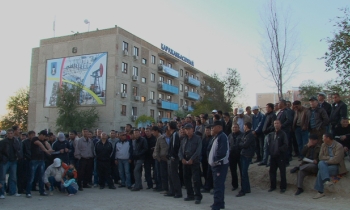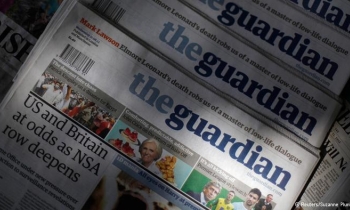In a country with few critical news sources, Cambodia's Radio Free Asia (RFA) is taking on tough stories about illegal logging, government corruption, and human rights abuses. As RFA puts the government on the spot, its reporters are being subjected to threats and harassment.
According to the Committee to Protect Journalists (CPJ), three of the station's 14 regular and on-call reporters have fled the country since 2005 due to death threats and potential government reprisals.
During a question-and-answer session with local journalists in front of the country’s National Assembly in May, Prime Minister Hun Sen referred to RFA staffer Um Sarin as “insolent†and “rude†after the reporter questioned him about the details of a government shakeup.
Hun Sen also warned Um Sarin that he should be afraid to ask similar questions in the future. Hun Sen’s bodyguards have barred the station's staffers from news events. For RFA journalists, the national attention given to them after the incident has raised fears of possible reprisals from pro-government groups. Um Sarin soon fled Cambodia for Thailand.
Recently, anonymous death threats were made against Lem Piseth after he reported on damage from deforestation in the Kompong Thom province in the centre of the country. The journalist has now fled the country to take refuge in Thailand.
Since a report on the over-exploitation of the Cambodian forests was released by an NGO Global Witness, all media have been subjected to unjustified state censorship. Information Minister Khieu Kanharith had warned the national media not to reproduce the report in any of the article or broadcasting. He also said that necessary legal action would be taken against those who will not respect the ban.
RFA is among several media outlets that have continued to talk about the report. A police official went to the radio station's broadcasting centre and ordered the journalists to desist. Following publication of the Global Witness report, Piseth wrote four articles on the damage resulting from deforestation in Kampong Thom province, particularly in the Tumring region, where it has been particularly disastrous.
While reporting in Kampong Thom, the reporter said he was followed by the police and the military. He had to leave the hotel room he was staying in for several nights at the request of the owners, who gave him no explanation.
In spite of calls from local and international press organisations, including CPJ, the Cambodian government has yet to launch an independent investigation into the death threat. The journalist has now fled the country to take refuge in Thailand.
However, later, Lem felt compelled to return to his home in Battambang province. “If I had stayed away from Cambodia any longer, I wouldn’t be able to help report the truth about my country’s problems,†he said. Lem has since resumed reporting in Cambodia, but to limit the risk, senior editors have reduced his regular broadcasts from five to three stories per week and taken him off the Prey Long beat.
In another incident, Sok Serei, one of the Cambodian correspondents of RFA Khmer-language service, was knocked off his motorcycle and seriously injured. Sok Serai is known for his investigative reports into allegations of corruption by government officials, which were broadcast by RFA.
Another correspondent of the radio channel in northeast Cambodia received threat by governor of Rattanakiri province. The governor told Sok Rathha, popularly known as pseudonym of Rathha visal that he wants to check the reports before going on air.
Cambodia has a dark history of persecuting its journalists, starting with the violent rule of the Khmer Rouge and continuing through a 1997 coup that brought Hun Sen to full power. Six journalists were killed in the 1990s.
Since Hun Sen has consolidated his political power at the ballot box, he has achieved dominance over Khmer-language Cambodian press and television stations. His party Cambodian People’s Party (CPP) and businesspeople loyal to the party hold government-administered print and broadcast licenses.
There are about 20 regularly published local-language newspapers, all but two of which are heavily slanted in favor of Hun Sen and CPP. The same is true for the country’s 11 television stations, which broadcast news that unfailingly casts Hun Sen’s government in a favourable light. One leading news station is run by the prime minister’s daughter, while others are owned by senior CPP members or their close business associates.
But the CPP-led government does not have a monopoly on radio news. High illiteracy and poverty rates mean that radio reaches more Cambodians than any other news source.
Established in Cambodia soon after Hun Sen launched his 1997 coup, RFA journalists have fashioned a grassroots style of reporting. It includes on-the-ground sound bites from citizens affected by the event and undercover reports on illegal activities — techniques that are rare in the rest of Cambodia's news media.
Journalists for this US government-funded broadcaster take unusual precautions such as reporting under pseudonyms and working from an unmarked office. This unfettered approach to the news has, over the years, lured listeners away from state-controlled stations, which still focus on senior government officials’ statements and activities.









